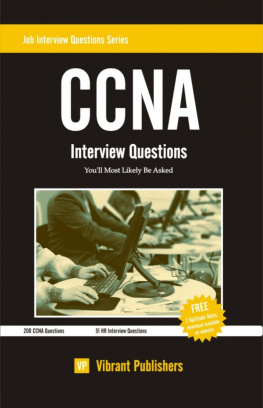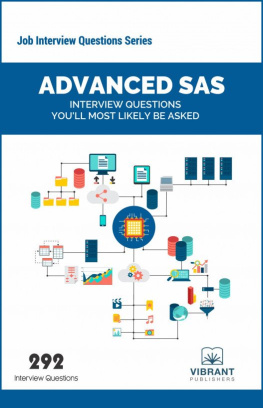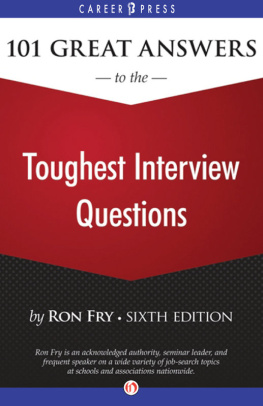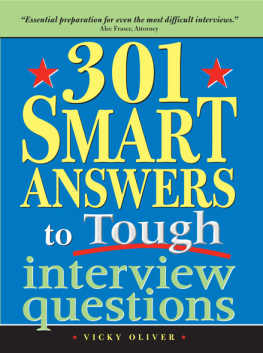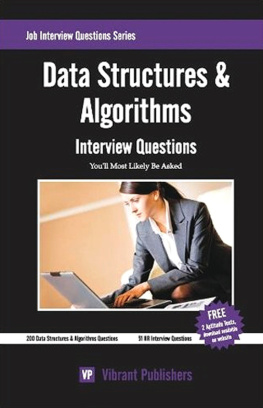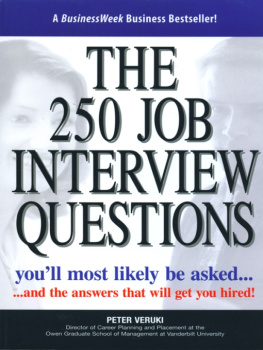ABOUT THE AUTHORS
Matthew J. DeLuca, SPHR, is a senior consultant with the Management Resource Group, Inc.a human resources consulting firm, in business for more than twenty years, providing a variety of practical people-driven organizational solutions. Matt is also the coauthor of several books including: 24 Hours to the Perfect Interview, Get a Job in 30 Days or Less, and Perfect Phrases for Negotiating Salary and Job Offers. He teaches HR and management topics in corporate settings as well as at the graduate and undergraduate levels of the Zicklin School of Business at Baruch College (City University of New York) and the Polytechnic Institute of New York University.
Nanette DeLuca is a principal with the Management Resource Group, Inc., and coauthor of 24 Hours to the Perfect Interview, Get a Job in 30 Days or Less, and Perfect Phrases for Negotiating Salary and Job Offers.
Acknowledgments
Any book requires the support and assistance of a variety of individuals who, in combination, lead to the completion of the project. At the top of our list are Matts colleagues at Baruch College of the City University of New York and Polytechnic Institute of New York University. Among these, we want to mention Al Booke, Hal Kaufman, Abe Tawil, Corey Hwong, John Lynch, Bernie Iatauro, John Miscione, David Falk, and Linda Moore, who have provided Matt with a great educational setting in which to grow professionally and an ongoing forum in which to develop new approaches to a variety of human resources issues. We also wish to thank our extremely talented human resources expert and friend Palma Braks.
Also to be mentioned is Dorrette Norris, a terrific HR professional, and also Andy Gold and Jonathan Opas, both seasoned professionals who seem to know everyone in health care who is in the human resources profession throughout the New York metropolitan area. Each of them has been great to work with, and all of them have helped Matt to gain additional insight into many job searches from a recruiters perspective in a most challenging environment.
Last, let us thank the people at McGraw-Hill for all their interest and attention. At the top of the list is Philip Ruppel, who has been with us from the start. He has guided us through the writing portion of our professional careers for many years. Thanks also to our editor, Emily Carleton, for taking us through the steps from book revision concept and proposal, to Maureen B. Dennehy for taking it to its successful conclusion, and to Alice Manning, our freelance copy editor, for reviewing with painstaking detail the final version of the text.
1
TALKING IS NOT COMMUNICATING
An interview is a conversation with a specific purpose. Both parties to the interview want something from the process. Thus, the ideal outcome of the interview is for both parties to feel that they have achieved their goals. The greater the area of common goals met, the greater the probability of a job offeror at least a continuation for one more round of the interviewing process.
What are the interviewers goals? One would hope that his primary goal is to fill the position. However, there are excellent, good, and poor interviewers out there, and the interviewers apparent agenda at an interview may differ widely from his real, not-so-obvious agenda.
Is this a courtesy interview?
Has the position been all but filled internally, and the organization is just going through the motions of a search?
What else is going on politically in the organization?
What kind of day is the interviewer having?
What is the interviewers next appointment?
Is the interview running late?
Importance of Knowledge Workers Who Are Excellent Communicators
Why should the interview count for so much when the type of skills it calls for do not seem to be the most important requirements for the job? Job seekers are frequently frustrated and feel hampered because they lack confidence in their oral communication ability. Additionally, the person who is trying to find a job may resent the interview process because it represents a real or perceived hurdle that acts as an impediment to job offers. (Im looking for a job, not to have meetings. Why cant they judge me by reviewing my paperwork and giving me a written test?The position I seek does not require interviewing skills anyway.)
This is a source of real agitation about the interview process. An applicant may be unable to communicate her work experience effectively even though she may be very successful at her work, and possibly even be an expert in the field. The question may be legitimate: what is the relevance of the interview if oral communication is not a major job requirement?
While many jobs do not require constant interaction with other employees, communicating effectively at work is becoming increasingly important, regardless of your position. Technology and changethe hallmarks of our current everyday environmentmake it increasingly important that you always be ready to communicate effectively. In fact, the reason that most people are not able to retain their current positions is problems with interpersonal relationships on the job. Failure to communicate effectively can be a real drawback to career progress.
The gurus publishing books on work-related issues today all seem to agree that we are living in a postindustrial age. Only about 10 percent of all workers in the United States are employed by companies in the manufacturing industry. The vast majority work in the service sector, and a smaller and smaller portion are in agriculture. These numbers have not changed significantly in quite a few years. So what is portrayed now as a sudden change has been a reality for a while.
The knowledge worker, on the other hand, is a concept that is very recent. Even though traditionally employers have usually frowned on the notion of the indispensable worker (their goal was to seek the opposite), there is now a growing realization that the most desired workers are those who bring their knowledge with them to the job. What the employer imparts and the employees absorb is a variety of mental concepts that enable an employee to build a personal database in his head that grows increasingly valuable to the employer. In fact, it is being grudgingly accepted that even the assembly-line worker in manufacturing (the most obvious object of the attempt to make every worker truly dispensable) is a knowledge worker. Employers are conceding the importance of the skill base that workers build as they grow with the organization. In the most manual and labor-intensive of jobs, the incumbents performing the jobs are appreciated more than ever. Concern for lost knowledge as members of an aging workforce retire extends beyond manufacturing. In health care, for instance, a very real challenge for the industry is dealing with masses of nurses in their fifties and sixties who are retiring. Organizations are letting these folks go without finding any real opportunities to corral the lifetime of expertise that these clinicians are taking out the door.
If the knowledge worker is becoming increasingly important, how does an employer determine which applicant has the experience (or potential) to be an effective worker in an environment where knowledge is so important? So much of what is perceived to be job-related knowledge is intangible, and, even if it could be determined with a written test, many employers would not see this as a practical alternative because of the time and expense required to develop such a test. Thus, the most common and the most practical choice is the hands-on personal interview, in which candidates are sized up, their work and education experience are evaluated, and their potential is assessed.


